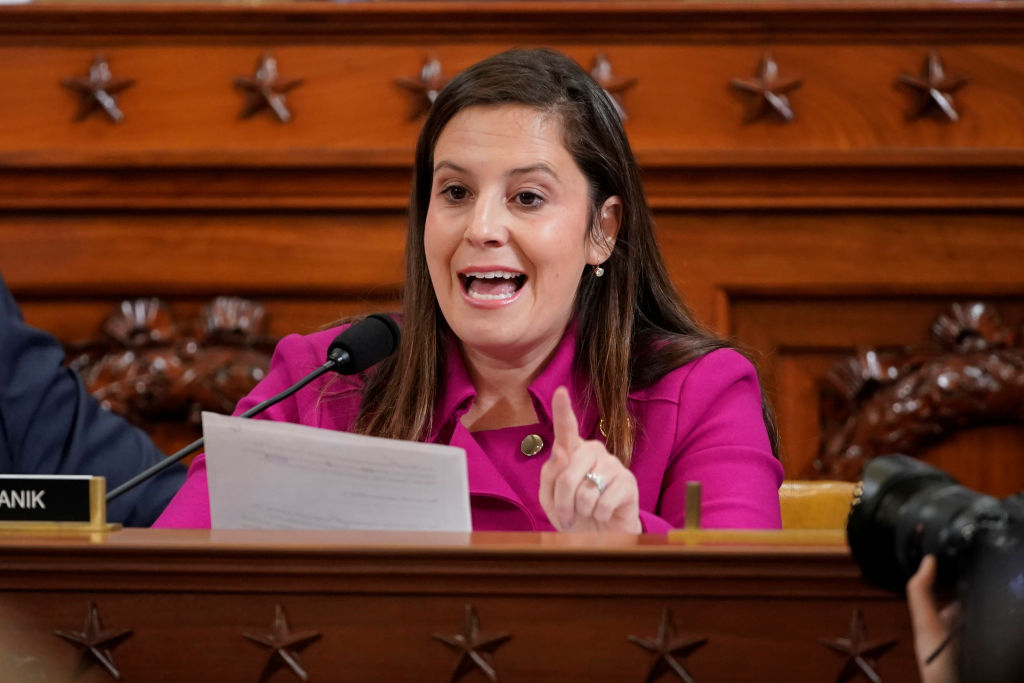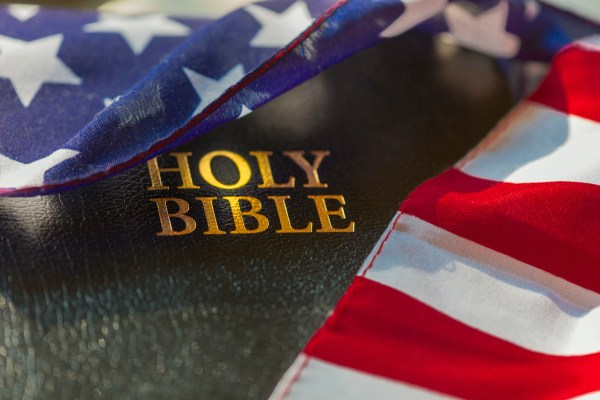Earlier this month, the GOP-led House Committee on Education and the Workforce (HCEW) subpoenaed three Harvard University officials in connection with its investigation into antisemitism there. InsideHigherEd reported that although HCEW has issued document requests—indeed, Harvard has already turned over numerous documents in response to such a request—it has never issued a subpoena to a university or college before.
This unprecedented move follows the testimony that presidents of Harvard, MIT, and Penn gave before HCEW late last year. In case you missed it, they flopped. But even if it’s been a few months since that incident, its lessons regarding how the government should handle questions of academic freedom—which were largely ignored at the time—will matter for years to come. And universities hoping to prosper amid scrutiny that shows no sign of letting up will need to learn from their mistakes.
Here’s the exchange that defined the debacle. Elise Stefanik, the self-proclaimed ultra-MAGA New York congresswoman and Republican conference chair, questions Claudine Gay, who resigned from the presidency of Harvard University in January. Virginia Foxx, HCEW chairwoman, comes in at the end.
STEFANIK: Can you say yes to that question of, does calling for the genocide of Jews violate Harvard’s rules on bullying and harassment?
GAY: Calling for the genocide of Jews is anti-Semitic.
STEFANIK: So yes?
GAY: And that is anti-Semitic speech. And as I have said, when speech—
STEFANIK: And it’s a yes?
GAY: Crosses into conduct—
STEFANIK: And it’s a yes. I’ve asked the witnesses—
GAY: When speech crosses—when speech crosses into conduct, we take action.
STEFANIK: So, is that a yes? … Is that a yes? You cannot answer the question.
GAY: When speech crosses into conduct—
FOXX: I’m—I’m sorry.
GAY: We take action.
FOXX: … I have to cut you off.
Penn’s Liz Magill, who also soon resigned, and MIT’s Sally Kornbluth answered the same question in the same way. All three oscillated between earnestly declaring themselves and their institutions as anti-hate while woodenly appealing to policies that permit hate speech. At all times on the defensive, they did little to explain these policies or past instances in which they had departed from them.
Some commentators have accused the university presidents of “smirking condescension.” There is something to that, but what they really needed was a position between arrogance and deference: principled defiance. To think about how one might do better, take a walk down academic memory lane to 1949.
That year Robert Maynard Hutchins, the chancellor of the University of Chicago, testified before the Illinois House Seditious Activities Investigation Commission, which had been created by the Illinois legislature to combat subversion. In authorizing the commission to investigate the University of Chicago, the legislature complained that some of the university’s students had protested anti-Communist legislation. That legislation—proposed by the commission itself—had among other things called for loyalty oaths and a purge of public officials and teachers “directly or indirectly affiliated with any communist; organization or any communist front organization.”
The reach of the proposed legislation is well-represented by how much weight it put on the word “indirectly.” The commission proposed that professors be fired for “indirectly” teaching or advocating communism. Moreover, the commission said, not just professors but anyone “in any way active in behalf of communism or of any communist organization or front organization” should be guilty of a felony carrying a minimum of one year’s jail time. Despite the stunning overreach of the bills in question, the legislature concluded from the involvement of University of Chicago students in a protest against the bills that it appeared students were being “indoctrinated with Communistic and other subversive theories.”
This was not Hutchins’s first rodeo. In 1935, as the historian John Boyer relates in his history of the University of Chicago, the university was named by Rep. Hamilton Fish III among those higher education institutions “honeycombed with socialists, near-socialists, and Communists, teaching class hatred, hatred of religion, and hatred of American institutions.” Hutchins’ response was not “denial” or “apology,” but rather the “assertion that free inquiry is indispensable to the good life, that universities exist for the sake of such inquiry.” Without free inquiry, Boyer goes on, Hutchins thought places like Chicago would “cease to be universities.” A special committee investigation launched by the Illinois Senate turned up nothing of consequence.
Nor did the 1949 commission lay a glove on Hutchins or the University of Chicago. That’s in part because of two things that Hutchins got right.
First, without denying that communism was a threat, Hutchins turned the charge of anti-Americanism against the commission. He characterized its proposed bills as “un-American, since they aim at thought control.” Moreover, when the commission charged Chicago professors with supporting various Communist front organizations, Hutchins rejected the premise of the charge. That “some communists belong to, believe in, or even dominate some of the organizations to which some of our professors belong,” he said, “does not show that those professors are engaged in subversive activities.”
Second, Hutchins explained that the University of Chicago’s tolerance for radicals reflected “the American faith in thought and discussion as the path to peaceful change.” The “policy of repression,” in contrast, “is contrary to the letter and spirit of the Constitution.” There is a kinship, Hutchins argued, between the free spirit that inhabits real universities and the “free spirit upon which” American “institutions are built.”
Having established the university’s kinship with liberal democracy, Hutchins came off as principled rather than evasive in this exchange with J.B. Matthews, the former chief investigator for the House Un-American Activities Committee, whom the Illinois Commission had hired to aid its work:
MATTHEWS: Some sixty odd [University of Chicago professors or professors emeritus] have been affiliated with 135 Communist Front organizations in 465 separate affiliations. Is that not something for which the University might well be alarmed?
HUTCHINS: I don’t see why.
Seventy-five years later, it’s unfortunate that the presidents of Harvard, MIT, and Penn all fell short of Hutchins’ principled commitment to academic freedom. It’s also disheartening to see how much the HCEW hearings paralleled the political theater of the Illinois Commission.
Campus antisemitism is a serious matter—about which I have written extensively—but HCEW showed little evidence of being serious about it. Chairwoman Foxx, for example, explained to the presidents that they had been summoned to “atone” for antisemitism on their campuses, before playing a short video, complete with scary music, of campus demonstrators chanting about “intifada.” She crowed that even “the most powerful elected Jewish politician in America,” Sen. Chuck Schumer, had given a speech that was a “sort of reckoning for the Jewish identity with the radical left.” Like her political ally, Donald Trump, who thinks that Jews who vote against him are ignorant or disloyal, Foxx suggested that Jews should wake up to their own responsibility for anti-Jewish prejudice. Then she chided the presidents for fomenting antisemitism.
That merits scorn. So does HCEW’s free speech hypocrisy. A few weeks prior to October 7, the Committee’s GOP majority released a report on “Freedom of Speech and its Protection on College Campuses.” The First Amendment was then a convenient club with which to beat liberals. So, HCEW’s GOP majority piously lectured universities regarding their failure to honor it. Colleges must not suppress even “repulsive” ideas. When “the authority to censor is assumed by universities, contrary opinions become endangered species.”
When Stefanik and her colleagues sought to hold universities to the First Amendment, they knew that it might protect neo-Nazi marches through Jewish neighborhoods or a Ku Klux Klan leader’s call for revenge delivered before an armed audience. It is more than probable, as the Foundation for Individual Rights and Expression (FIRE) has stated, that “the First Amendment would generally protect … students peacefully marching across the quad chanting ‘From the river to the sea, Palestine will be free,’ even if the chant were interpreted as supporting the ethnic cleansing or genocide of Israelis.”
Stefanik and her colleagues—some of whom think the First Amendment demands great circumspection when it comes to holding Donald Trump accountable for January 6—like the First Amendment when it helps their friends and hate it when it helps their enemies.
That’s not to say that they were altogether wrong. Although the streets of Philadelphia and Boston were no better than the campuses of Penn, Harvard, and MIT, it’s troubling that, according to the Anti-Defamation League’s recent national survey, only 39 percent of Jewish students feel “very” comfortable with others knowing that they are Jewish. University diversity, equity, and inclusion efforts have rarely taken antisemitism as seriously as other kinds of prejudice.
Moreover, the commitment of the three universities to free speech and intellectual diversity has been spotty. None of them, though questioned about it, showed any concern about the shrinking pool of conservatives in academia. Ideology can influence what questions investigators consider pressing, what courses teachers want to require, what research findings scholars view skeptically, and even which students administrators view as partners rather than irritants. Whatever the cause of the relative ideological uniformity of elite universities, it’s hard to take their marketplace of ideas rhetoric seriously when they do not appear to take it seriously themselves.
Perhaps that is why the presidents couldn’t mount the kind of counteroffensive Hutchins mounted against the Illinois Seditious Activities Investigation Commission. Rather than fall back on a legalistic defense of the university’s policy, Hutchins spoke from a profound sense of the university’s civic mission. For him, that mission did not necessitate that the university make moral pronouncements, even of the agreeable “hate has no home here” variety favored by today’s presidents. Rather, the university’s mission is “to enlighten the community, to provide citizens who know the reasons for their faith and who will be a bulwark to our democracy because they have achieved conviction through study and thought.”
The inadvertently comic HCEW—which went so far as to make plagiarism allegations against Claudine Gay a matter requiring Congressional investigation—probably won’t help universities recover their sense of mission. They might, however, cause them to suppress more speech. But those who wonder if universities can make some headway on their own might look to MIT, whose president, Sally Kornbluth, unlike the others, remains in office.
Some commentators have pointed out, as evidence of MIT’s hypocrisy on free speech, that the university disinvited the physicist Dorian Abbot from giving a prestigious lecture when students objected to his (perfectly mainstream) position on affirmative action. What they do not point out is that, in the aftermath of the Abbot affair, MIT formed a working group that drafted a superb statement on free expression and academic freedom, which the faculty adopted in late 2022.
That statement, as if in direct response to Abbot’s student critics, affirms that MIT’s “commitment to free expression includes hearing and hosting speakers, including those whose views or opinions may not be shared by many members of the MIT community and may be harmful to some.” MIT is one of numerous campuses to adopt, in recent years, strong statements on campus free expression, many of them modeled on the University of Chicago’s 2014 “Report of the Committee on Free Expression,” which refers four times to one Robert Maynard Hutchins.
Do such statements by themselves fix an institutional culture? Certainly not. But by the same token, MIT’s example suggests that universities may not need performative legislators like Elise Stefanik to tell them what to do.








Please note that we at The Dispatch hold ourselves, our work, and our commenters to a higher standard than other places on the internet. We welcome comments that foster genuine debate or discussion—including comments critical of us or our work—but responses that include ad hominem attacks on fellow Dispatch members or are intended to stoke fear and anger may be moderated.